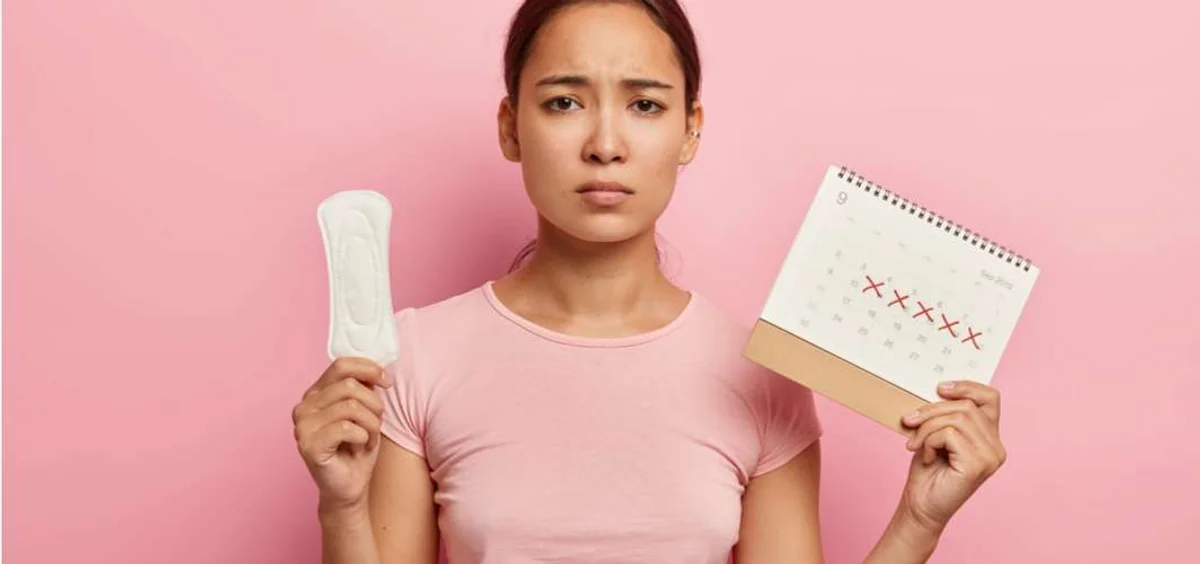- Home
- Blog
- Women's Wellness
Why Some Women Have Irregular Menstrual Cycles
Women's Wellness
Why Some Women Have Irregular Menstrual Cycles
By Apollo 24/7, Published on- 15 February 2021, Updated on -18 October 2022
Share this article
0
4 likes

Menstruation, also called period or menses, is a natural phenomenon where a woman sheds the lining of the uterus (womb) every month. A woman bleeds for about 2 to 8 days during one period cycle. The menstrual cycle is considered to begin from the first day of the period and is usually 28 days long. However, the cycle can range from 21 days to about 35 days for some women.
During the first few years after menstruation starts, the period cycle tends to be irregular as the hormones that control menstruation take a few years to balance out. Irregular periods are also experienced by women approaching perimenopause and menopause. Apart from these, there can be various other reasons for an irregular menstrual cycle.
What is an irregular menstrual cycle?
Around 14% to 25% of women in their childbearing age experience irregular menstrual cycles. An irregular menstrual cycle refers to a period cycle that can be shorter or longer than normal or with bleeding heavier or lighter than normal. The most common menstrual irregularities include:
- Amenorrhea: Complete absence of periods.
- Oligomenorrhea: A gap of more than 35 days between two period cycles.
- Polymenorrhea: A gap of fewer than 21 days between two period cycles.
- Menorrhagia: Excessive bleeding during a period cycle.
- Dysmenorrhea: Extremely painful periods accompanied by severe menstrual cramps.
- Prolonged period cycle: Bleeding that continues for more than 8 days.
- Shortened period cycle: Bleeding that stops within 2 days.
- Spotting/ Intermenstrual bleeding: Bleeding that occurs between two period cycles.
What is the reason for an irregular menstrual cycle?
Some of the most common causes of irregular periods include:
- Hormonal imbalance: A shift in the hormone levels, often seen during puberty and menopause, can disrupt the period cycle.
- Polycystic ovary syndrome (PCOS): Sex hormones get imbalanced in PCOS resulting in an irregular menstrual cycle.
- Uncontrolled diabetes: Increased blood sugar levels can affect the hormones in the body resulting in an irregular period cycle.
- Thyroid disorders: Both hypothyroidism (underactive thyroid) and hyperthyroidism (overactive thyroid) can disrupt the menstrual cycle.
- Eating disorders: Disorders such as anorexia nervosa or bulimia can reduce the levels of the hormone in the body, thus negatively affecting the period cycle.
- Hyperprolactinemia: Increased levels of prolactin (a protein hormone) in the blood can disrupt the period cycle.
- Premature ovarian failure (POF): In POF, the ovaries stop working properly before the age of 40, resulting in irregular periods.
- Medications: Use of medicines such as birth control pills, anti-epileptics and antipsychotics can cause irregular periods.
- Uterine polyps or fibroids: These small growths in the lining of the womb (uterus) can increase the bleeding and pain during periods.
- Thyroid disorders: Overactive thyroid (hyperthyroidism) or underactive thyroid (hypothyroidism)
- Endometriosis: Endometriosis can result in abnormal bleeding and severe pain before and during periods.
- Intrauterine devices (IUD): Use of IUDs can disrupt the menstrual cycle and can cause heavy/light bleeding during periods.
- Pelvic inflammatory disease: PID, a bacterial infection, can result in pain in the pelvic region, heavy vaginal discharge and irregular periods.
- Stress: Increased levels of stress hormones in the body can either delay or prolong the period cycle.
- Extreme changes in weight: Sudden weight gain or weight loss can disrupt the period cycle.
Can an irregular period cycle be treated?
Most women do not require treatment for their irregular period cycle as it usually gets back to normal in the next one. However, if the irregularity in the menstrual cycle is occurring due to an underlying condition, further investigation or treatments may be required. The treatment often involves:
- Use of birth control pills or other hormones to manage polycystic ovary syndrome.
- Use of thyroxine to maintain the hormonal balance in people suffering from hypothyroidism.
- Changing birth control if the woman continues to have irregular periods even after 3 months of use.
- Taking up exercises such as yoga, tai chi along with meditation to reduce the levels of stress.
- Hormone therapy, for irregular menstrual cycles due to a lack of or imbalance in sex hormones (estrogen and progesterone) in their body.
- Women with fibroids or uterine polyps may require surgery to remove the tissues present in the reproductive tract.
When to consult a doctor?
A gynaecologist must be consulted if a sudden change in the monthly period pattern is observed, as it is always better to rule out any possible problem at an early stage. A woman must consult their doctor if they:
- Are below 45 years and their period cycle becomes irregular suddenly.
- Bleed for more than 7 days.
- Miss three or more periods a year.
- Get periods more often than every 21 days or less often than every 35 days.
- Bleed more heavily than usual during the period cycle.
- Experience excessive pain than usual during their period.
- Have irregular periods and are unable to get pregnant.
The doctor would perform a physical exam and would recommend certain tests to determine the underlying cause.
Takeaway
Changes in the levels of the hormones estrogen and progesterone usually disrupt the normal period cycle in women. This is mostly seen in girls going through puberty and women approaching menopause. While having irregular periods once or twice a year should not be a matter of concern, frequent episodes of missing periods, heavy/light periods or any other menstruation-related issue must be reported to a doctor.
For any queries related to women's health, speak to a gynaecologist.
Services
Women's Wellness
Leave Comment
Services
Recommended for you

Women's Wellness
Gynaecological Problems After COVID-19 Recovery
While little research has been done on the effect of the COVID-19 virus on the reproductive system of women, some gynaecological issues have been noted after their recovery.

Women's Wellness
Are Autoimmune Diseases More Prevalent in Women?
Women have a higher incidence and prevalence of autoimmune diseases than men, and 85% or more patients of multiple autoimmune diseases are female.

Women's Wellness
Why Some Women Experience Heartburn During Pregnancy
Changes in hormone levels and body shape due to the baby growing may be the cause of heartburn in pregnant women. Usually, heartburn symptoms are mild and manageable during pregnancy.
Subscribe
Sign up for our free Health Library Daily Newsletter
Get doctor-approved health tips, news, and more.

